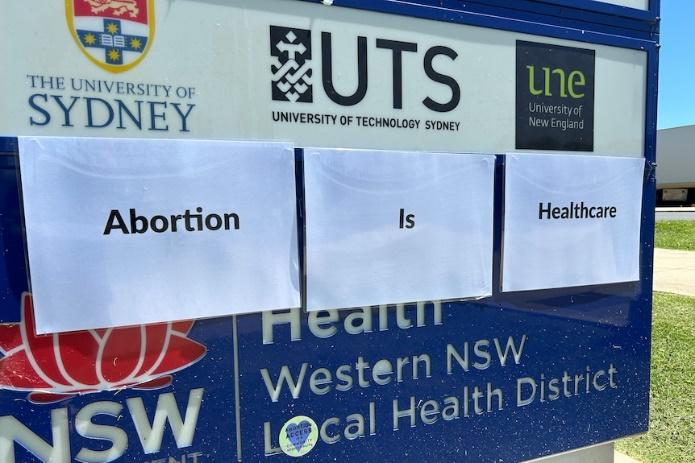
The ABC news network has uncovered fresh evidence that a public hospital in regional New South Wales has implemented a formal abortion ban. Queanbeyan Hospital was providing surgical terminations for fetal anomalies and medical reasons. But an ABC investigation revealed the service stopped abruptly in August, after a woman was turned away on the day of her planned procedure.
In response to that woman’s experience, health practitioners warned of an “unspoken ban”. But the ABC has now obtained an email that proves the hospital has formally ceased providing the time-critical health care.
Almost 20 clinicians and health professionals have raised concerns with the ABC about conscientious objection being used to obstruct access to abortion care.
The email was sent last month to health practitioners outside the hospital, who had sought clarification from the Southern NSW Local Health District (LHD) on where to refer patients requiring surgical terminations. It appears to have been sent from one of the hospital’s doctors, on behalf of executive management. The email reads: “It has been identified that this procedure has been performed whilst there has been no supporting framework within the hospital. As such, the (Local Health) District is now looking at what this might look like moving forward and until such times, this procedure does not currently sit within Queanbeyan Hospital’s delineation.”
The ABC contacted the LHD to ask what was meant by a “supporting framework” and whether surgical terminations at Queanbeyan Hospital would be reinstated. The LHD said it “continues to provide abortion care services and is actively developing more reliable and visible care pathways to assist the women of our community. These pathways to abortion care services will be made known to GPs and other relevant health providers.”
Queanbeyan still provides medical terminations, where a patient takes mifepristone+misoprostol pills to bring on a miscarriage. The LHD also said: “Personal beliefs of staff cannot impact a woman’s right to access abortion care. If individual clinicians conscientiously object, referral pathways are in place to ensure women can safely access care.”
At a press conference on 13 November, NSW Health Minister Ryan Park said the Department was looking into the issue at Queanbeyan Hospital. “There is absolutely no plan to have abortions banned at our hospitals, including that hospital,” he said. “The advice I’m getting, and it’s initial advice, is that it was a particular procedure they weren’t comfortable in carrying out at that particular facility. I’m looking at that to see why that was the case.”
Meanwhile, the Health Minister was facing mounting pressure. Last week, the ABC revealed that Orange Hospital in the state’s central-west had introduced new policy banning abortions for people with no identified pregnancy complications or medical reasons. Previously, both medical and surgical abortions were provided, regardless of circumstance, health staff said.
Under NSW law, health practitioners who have a conscientious objection can refuse to provide abortions as long as they disclose their position as soon as possible and refer the patient to another practitioner who can provide the service. But the conscientious objection clause does not apply to hospital executives or the Local Health Districts that oversee them. It only applies to the individuals working within them. The Orange Hospital ban had been laid down by the executive of a regional NSW public hospital.
Rural and regional hospitals face ongoing challenges such as staff shortages. But Orange Hospital staffers maintained that abortion services should not be sacrificed, even if resources were stretched. “You can’t actually refer to a GP: the patient has to book an appointment. And the wait time for GPs in Orange is about two weeks.”
That afternoon, the Health Minister made a spectacular intervention, announcing on social media that the ban in Orange Hospital had been reversed. Public pressure is mounting on the health minister to make abortion services available across public hospitals throughout the state.
Surgical abortions and treatment of miscarriages are carried out with D&C in this hospital, requiring a hospital stay (which was reported without comment!), while medical abortions can be administered in the community with abortion pills.
All GPs are allowed to prescribe pills for medical terminations up to nine weeks of pregnancy. But one local GP, who did not want to be identified, said they knew of only five doctors providing abortions for a town of 40,000 people. Having seen the hospital’s new flowchart, the doctor said they had begun feeling “nervous and vulnerable” and as if they were “operating outside the accepted mode of practice” by providing medical terminations. “I’m confident in the medicine but I know that if there’s complications, such as retained product or bleeding, I will need the hospital’s input for that situation,” they told the ABC.
STOP PRESS: On 14 November, it was announced that Queanbeyan Hospital was also set to reinstate surgical abortion services. Moreover, the NSW Local Health District announced it will establish two new clinics which will provide services for abortions between 9-14 weeks, one at Queanbeyan Hospital and the other at Moruya, on the state’s south coast. They also confirmed that “any practitioner who is asked to perform, assist in or advise on a termination of pregnancy has the right to a conscientious objection”.
SOURCES: abcnews, 8 November 2024 + PHOTO by Micaela Hambrett, ABC Central West ; abcnews, 8 November 2024 (later the same day). STOP PRESS: ABC News, by Lucy Barbour, 14 November 2024.



